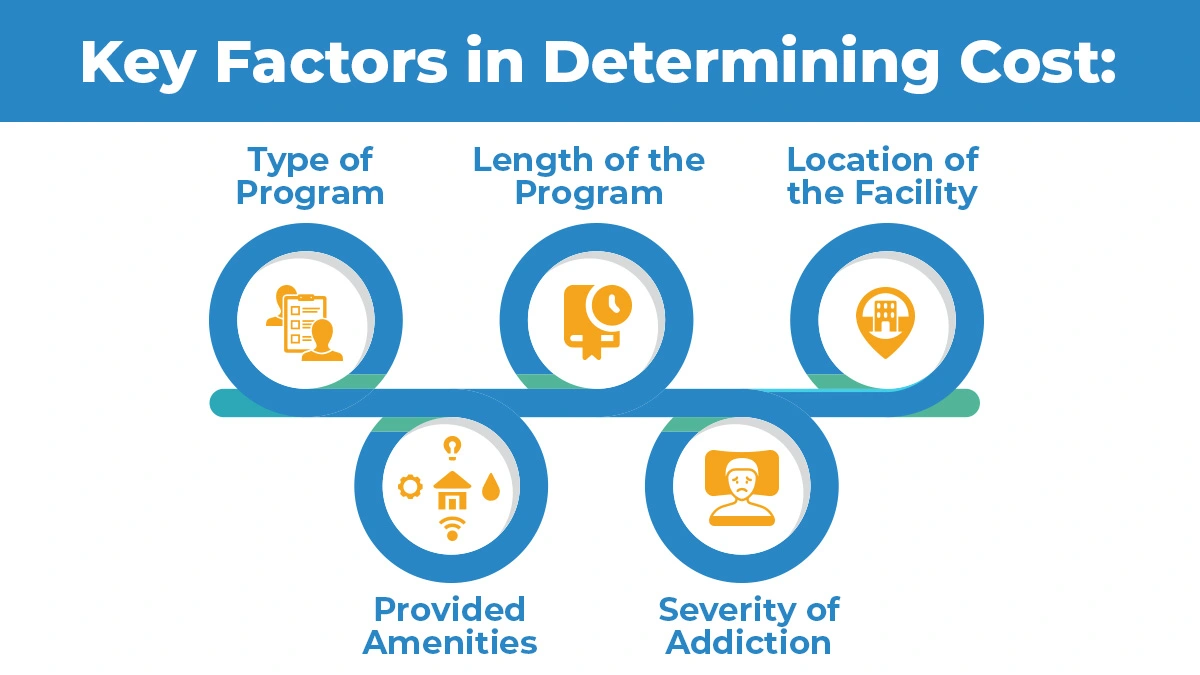
How Long Are Drug Rehab Programs: A Complete Guide
Explore how long drug rehab programs are with the complete guide from The Recovery Team-Newton.

Seeking substance abuse treatment can be an integral step towards recovery. However, the cost of drug rehab without health insurance coverage can be a concern for many individuals. The expenses can vary depending on factors like the duration of treatment, the facility’s amenities, and the type of treatment provided.
Understanding the possible costs can facilitate educated decisions about their treatment options. This article explores available resources and financing options to access the necessary support for addiction recovery.
The cost of drug rehabilitation in the United States varies depending on various factors. Here’s what you need to know:
The Recovery Team-Newton offers comprehensive and personalized addiction treatment in a supportive and compassionate environment. Call us at (508) 978-2772 to explore how we can help you recover.
Drug rehab is vital for mental health recovery from substance abuse. It provides a structured environment for individuals to address addiction‘s physical and psychological aspects. Rehab offers various therapies and treatments tailored to each person’s needs, including counseling, medication, and support groups.
Drug rehab costs in the United States vary based on several factors. Insurance companies can help offset expenses, with many plans covering at least part of the treatment.
State-funded and non-profit rehab centers offer more affordable options, sometimes even free. Additional expenses may include medication, therapy sessions, and aftercare programs. Financial assistance and payment plans are often available to make treatment more accessible.
Understanding the factors influencing the cost of drug rehab is essential for making informed decisions about treatment options. These factors can vary widely and impact the overall expenses significantly. Now, please provide the factors determining the cost of drug rehab.
The cost of a drug rehabilitation program can vary depending on whether it is an inpatient or outpatient program. Inpatient programs, where individuals stay at the facility full-time, generally cost more due to housing, meals, and intensive care.
Outpatient programs, where individuals attend therapy sessions while living at home, are cheaper since accommodation and meals aren’t included. The intensity of care and level of medical supervision also impact costs.
Inpatient rehab may be necessary for severe addiction cases, while outpatient programs offer flexibility for those with milder substance abuse issues. Learning these differences helps individuals choose the most suitable and affordable option for alcohol abuse or drug recovery.
The duration of the drug rehab program is another significant factor affecting its cost. Longer programs typically incur higher expenses due to extended treatment and support. Short-term programs, lasting a few weeks to a month, may be less costly but might need to provide more time for comprehensive recovery with specific needs.
Conversely, longer-term programs, spanning several months to a year, offer more extensive support and therapy, contributing to higher costs. The length of the program often depends on the severity of the addiction and individual needs. The duration helps individuals’ treatment plan and budget for addiction recovery effectively.
The location of the drug rehab facility influences its cost; for example, facilities in urban areas or regions with high living expenses typically charge more for services. Operating costs, such as rent and staffing, are higher in these areas. In contrast, rural or less populated rehab centers may offer more affordable options.
However, individuals may need to consider travel expenses when choosing a facility that is farther away. The facility’s location can also impact the overall environment and available amenities, which may affect the cost. Considering location helps individuals find accessible and cost-effective support for recovery.
The amenities provided by the drug rehab facility can impact the cost of treatment. Facilities offering luxury amenities such as private rooms, gourmet meals, recreational activities, and spa services charge higher fees. These additional amenities enhance comfort and convenience during the recovery process but come at an extra cost.
On the other hand, basic rehab centers may offer fewer amenities but provide essential treatment services at a lower price. Individuals should consider their preferences and budget when choosing a facility based on amenities.
The type, severity, and duration of addiction significantly influence the cost of drug rehab. Severe addictions often require more intensive treatment, including medical detoxification and longer therapy sessions, resulting in higher expenses.
Additionally, the type of substance abused can impact the complexity of treatment and associated costs. Longer durations of addiction may necessitate extended rehab stays for effective recovery, contributing to increased expenses. Individuals with co-occurring mental health disorders may require specialized dual diagnosis treatment, further affecting costs.
The average cost of drug rehab without insurance varies widely depending on several factors, including the type of program, location, amenities, and duration of treatment. Longer-term programs or those with luxury amenities can exceed these ranges significantly.
Inpatient rehab treatment typically involves residing at a facility for a set period and receiving 24/7 care, therapy, and medical supervision. The cost of inpatient rehab can vary greatly depending on location, amenities, and duration.
On average, a 30-day inpatient rehab program can cost between $6,000 and $20,000, while longer-term programs may range from $12,000 to $60,000 or more. These costs include accommodation, meals, therapy sessions, and medical care, with additional expenses for specialized treatments or luxury amenities.
Outpatient rehab treatment allows individuals to attend therapy sessions and receive support while living at home. This option tends to be less expensive than inpatient rehab since accommodation and meals aren’t provided.
Outpatient rehab costs vary based on program duration, intensity, and location. On average, outpatient rehab programs may range from $1,000 to $10,000 for a three-month program. Some facilities offer lower-cost or sliding-scale options to accommodate individuals with limited financial resources, making outpatient rehab a more affordable choice for some.
When comparing the costs of inpatient and outpatient rehab, several factors come into play. Inpatient rehab costs more due to the 24/7 care, accommodation, and meals. However, outpatient rehab offers flexibility and allows individuals to continue working or attending school while receiving treatment. Ultimately, the choice between inpatient treatment and outpatient rehab depends on individual needs, preferences, and financial considerations.
Various additional costs may accompany drug rehab treatment beyond the basic program fees. These costs can include drug detoxification, therapy and counseling sessions, medications, and aftercare programs.
Drug detoxification, the process of safely removing toxins from the body, often incurs additional costs in drug rehab. Medical detox may involve medications to manage withdrawal symptoms and medical supervision to ensure safety. The cost of drug detox can vary depending on the type of substances abused, the severity of addiction, and the duration of detoxification.
Therapy and counseling sessions are fundamental components of drug rehab, aiming to address underlying issues contributing to addiction and teach coping skills for sobriety. These sessions may include individual therapy, group therapy, family therapy, or specialized modalities such as cognitive behavioral therapy (CBT) or dialectical behavior therapy (DBT). The cost of therapy and counseling can vary based on the frequency and duration of sessions and the therapist’s qualifications.
Medications may be prescribed as part of drug rehab treatment to manage withdrawal symptoms, cravings, or co-occurring mental health disorders. The cost of medications can vary depending on the type, dosage, and duration of treatment.
Some medications may be covered by insurance, while others require out-of-pocket expenses. Access to affordable medicines is essential for effective addiction recovery from substance abuse.
Aftercare programs provide ongoing support and resources to individuals after completing drug rehab treatment. These programs may include sober living arrangements, continued therapy sessions, support groups, or vocational training.
The cost of aftercare programs varies depending on the services offered and the duration of participation. Investing in aftercare can significantly improve long-term sobriety outcomes and prevent relapse with the level of care, making it an essential aspect of comprehensive drug rehab treatment.
It is essential to understand the financial implications of rehab versus substance abuse when deciding on treatment options. Healthcare expenses have increased due to health problems associated with certain conditions.
The direct costs of substance abuse encompass expenses directly related to drug use, including the purchase of drugs, medical treatments for drug-related health issues, legal fees, and law enforcement costs. These costs can add up significantly over time, impacting both the individual and society. Direct costs of substance abuse are estimated to be in the billions annually.
In addition to direct costs, substance abuse incurs hidden costs that are often overlooked but have significant impacts. These hidden costs include decreased work productivity, absenteeism, accidents and injuries, strained relationships, family dysfunction, and increased healthcare expenses due to associated health problems such as addiction-related medical conditions and mental health disorders. These hidden costs can be substantial and contribute to the overall burden of substance abuse on individuals and society.
Investing in rehab treatment offers a significant return on investment in improved health outcomes, increased productivity, reduced healthcare costs, and enhanced quality of life. While the initial cost of rehab may seem high, especially compared to the cost of substance abuse, the long-term benefits far outweigh the expenses.
Research shows that people who undergo rehab treatment have higher rates of sustained sobriety, improved mental health, and better overall functioning, leading to a more fulfilling and productive life. Thus, rehab treatment is a worthwhile investment in mental health and well-being.
Paying for drug rehab without insurance can be challenging, but several options are available. Personal savings can cover expenses, or individuals can explore loans and credit options.
Fundraising or crowdfunding campaigns can also help raise funds for treatment. Some rehab facilities offer sliding-scale fee structures based on income, making treatment more affordable.
Additionally, scholarships and grants specifically for rehab may be available. Government programs and state-funded initiatives can provide financial assistance for substance use disorder treatment. It’s essential to inquire about payment options and explore all available resources when seeking addiction treatment at a treatment center.
At The Recovery Team-Newton, we understand the daunting hurdles individuals face on the path to overcoming addiction. That’s why we’re dedicated to offering comprehensive services tailored to your needs.
From our comprehensive day treatment program providing structured support throughout the day to our specialized dual diagnosis treatment addressing co-occurring mental health disorders, we ensure holistic care. Our medication-assisted treatment integrates medications with therapy for effective addiction management, while our intensive outpatient program offers flexible support for those balancing recovery with daily life.
Don’t let financial worries keep you from seeking the help you deserve. Speak with a counselor at (508) 978-2772 to explore affordable options.

Explore how long drug rehab programs are with the complete guide from The Recovery Team-Newton.

Learn how to have fun without alcohol with the tips from The Recovery Team-Newton.

Does Medicaid cover drug rehab? Learn about the eligibility criteria with expert insights at The Recovery Team-Newton.
The average cost of inpatient rehab for addiction in the United States ranges from $5,000 to $25,000 per month. Cost factors include location, amenities, stay duration, and treatment program type. Some rehabs accept insurance, which can reduce out-of-pocket expenses.
Financial assistance and sliding scale fees may also be available based on income. It’s essential to research various options and inquire about payment plans or assistance programs to find the most suitable and affordable option for treatment.
Rehab costs refer to the expenses associated with addiction treatment. These costs cover services provided by treatment facilities and medical professionals.
Insurance plans, including private insurance, may help cover these costs, but patients may still have out-of-pocket expenses. Treatment programs vary in intensity, including outpatient and inpatient options, with different levels of care.
Some states offer low-cost or state-funded programs, while others accept private insurance or payment via credit cards. Learning rehab costs is vital for patients seeking treatment and navigating insurance coverage.